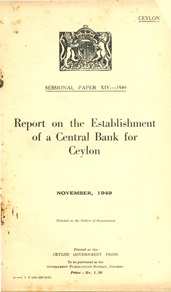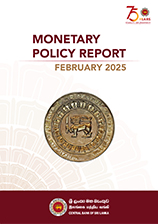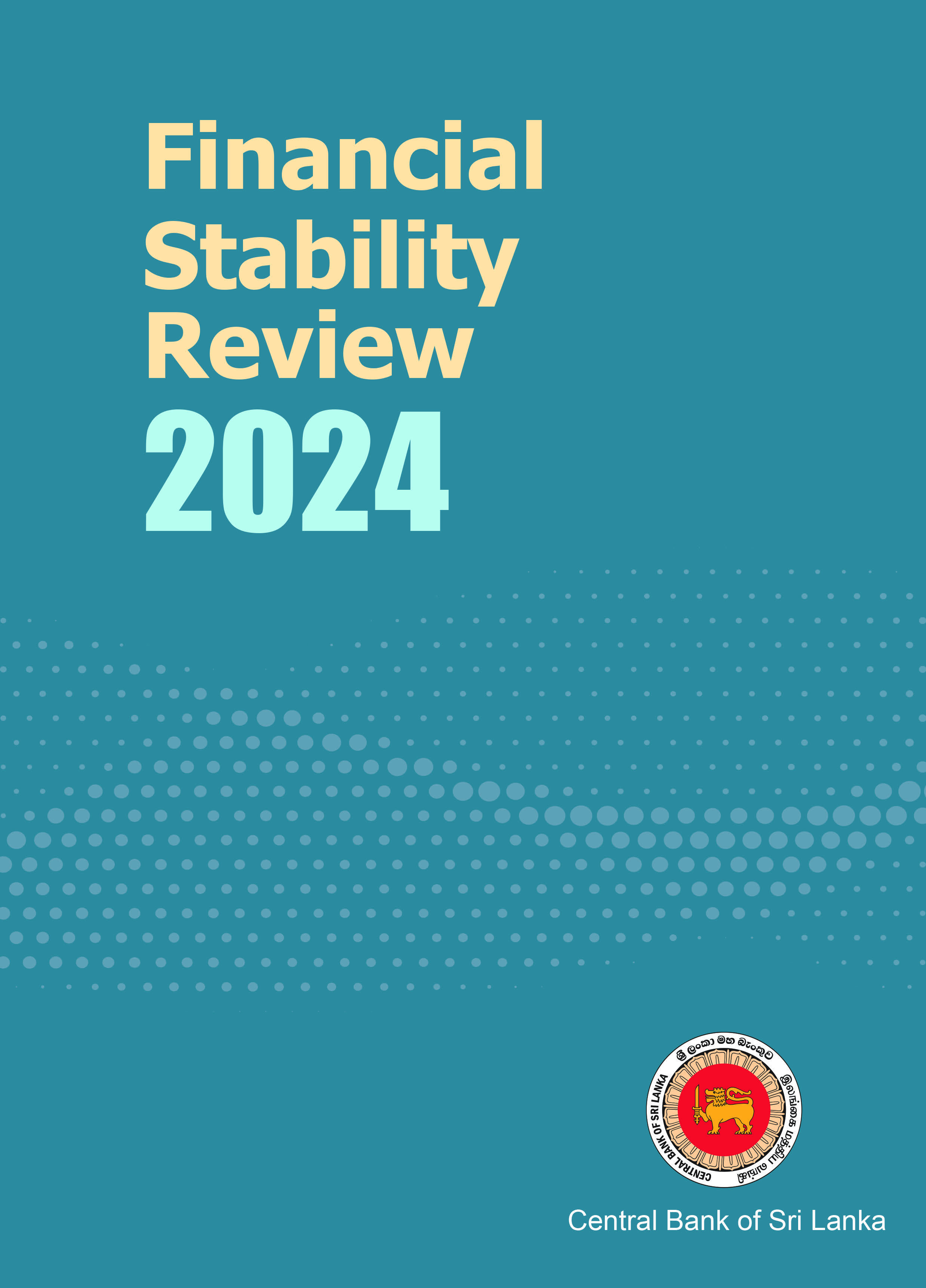The Central Bank has released a pamphlet on ‘Monetary Policy Implementation in Sri Lanka’ in all three languages, with the aim of enhancing awareness of the general public on the role of the Central Bank in the implementation of monetary policy in Sri Lanka. As a part of the broader communication strategy of the Central Bank, this publication presents a simple discussion on the technical aspects of monetary policy implementation, making it accessible to individuals from various backgrounds and providing valuable insights into monetary policy formulation, implementation, monetary instruments and transmission mechanism, while serving to eliminate any misperceptions on monetary operations among the general public.
-
The Central Bank releases a Pamphlet on Monetary Policy Implementation in Sri Lanka
-
Non-Renewal of the Money Changing Permits issued to fifteen (15) Money Changers (MCs) for the year 2023
The Monetary Board of the Central Bank of Sri Lanka has decided not to renew the money changing permits of the 15 MCs listed below for the year 2023, due to the non-compliance with a condition of the permits issued for the year 2022, which was communicated to the respective MCs on 22.02.2023.
-
Real Estate Agents are Advised to Ramp up AML Measures
The Financial Intelligence Unit (FIU) of the Central Bank of Sri Lanka organized an awareness program for the real estate sector on “Anti-Money Laundering and Countering the Financing of Terrorism (AML/CFT) Compliance Obligations and New Developments” on June 26, 2023. The keynote address was delivered by Dr. Nandalal Weerasinghe, Governor of the Central Bank of Sri Lanka/Chairman, National Coordinating Committee on AML/CFT, and Mr. W S Sathyananda, Secretary to the Ministry of Urban Development and Housing, Eng. R H Ruvinis, Chairman of the Construction Industry Development Authority (CIDA) and Mr. Hardy Jamaldeen representing the real estate sector also addressed the gathering, while Mr. Sarana Karunaratna, Chairman of the Condominium Management Authority (CMA) also graced the occasion.
-
The Central Bank of Sri Lanka further reduces Policy Interest Rates
The Monetary Board of the Central Bank of Sri Lanka, at its meeting held on 05 July 2023, decided to reduce the Standing Deposit Facility Rate (SDFR) and the Standing Lending Facility Rate (SLFR) of the Central Bank by 200 basis points (bps) to 11.00 per cent and 12.00 per cent, respectively. The Board arrived at this decision following a careful analysis of the current and expected developments, including the faster-than-envisaged disinflation process and benign inflation expectations in the domestic economy, with the aim of enabling the economy to reach its potential and stabilising inflation at mid-single digit levels in the medium term, while easing pressures in the financial markets. The Board expects that, with this reduction of policy interest rates by 200 bps, and the reduction of policy interest rates by 250 bps in early June 2023, along with the significant reduction of risk premia on government securities witnessed recently, the market interest rates, particularly lending rates, will adjust downwards adequately and swiftly. Therefore, the banking and financial sector is urged to pass on the benefits of this significant easing of monetary policy by the Central Bank to individuals and businesses, thereby supporting economic activity to rebound in the period ahead.
-
Extension of the Suspension of Business of Perpetual Treasuries Limited
The Monetary Board of the Central Bank of Sri Lanka, acting in terms of the Regulations made under the Registered Stock and Securities Ordinance and the Local Treasury Bills Ordinance, has decided to extend the suspension of Perpetual Treasuries Limited (PTL) from carrying on the business and activities of a Primary Dealer for a further period of six months with effect from 4.30 p.m. on 05th July 2023, in order to continue the investigations being conducted by the Central Bank of Sri Lanka.
-
CCPI based headline inflation recorded another sharp decline in June 2023
Headline inflation, as measured by the year-on-year (Y-o-Y) change in the Colombo Consumer Price Index (CCPI, 2021=100) decreased to 12.0% in June 2023 from 25.2% in May 2023. The decline in the headline inflation is broadly in line with the disinflation path envisaged by the Central Bank of Sri Lanka (CBSL) in April 2023.
-
External Sector Performance - May 2023
The cumulative trade deficit remained modest so far during 2023. The trade deficit in May 2023 widened, compared to a year ago, for the first time since February 2022.
Workers’ remittances in May 2023 recorded higher than that of the previous month. Earnings from tourism recorded a robust growth despite being lower than April 2023 due to seasonal affects.
There was a notable appreciation of the exchange rate by 8.8 per cent during May 2023.
Foreign investments in the government securities market recorded a notable net inflow during May 2023.
The receipt of USD 350 million from the Asian Development Bank (ADB) as well as substantial net purchases of forex by the Central Bank from the market, resulted in the gross official reserve level (GOR) increasing to about US dollars 3.5 billion by end May, compared to US dollars 2.8 billion as at end April 2023.
-
Sri Lanka Purchasing Managers’ Index - May 2023
In May 2023, Purchasing Managers Indices indicated an expansion in Services activities and a contraction in Manufacturing activities.
Manufacturing PMI declined in May 2023, yet at a slower rate, indicating a month-on-month contraction in manufacturing activities. Accordingly, Manufacturing PMI recorded an index value of 46.2 in May, driven by decreases recorded in all the sub-indices.
Services sector PMI returned to the growth territory recording an index value of 53.5 in May 2023 following the marginal drop observed in the previous month. This was led by the increases observed in New Businesses, Business Activities and Expectations for Activity. Nevertheless, Employment and Backlogs of Works continued to decrease during the month.
-
The Central Bank of Sri Lanka Relaxes its Monetary Policy Stance
The Monetary Board of the Central Bank of Sri Lanka, at its meeting held on 31 May 2023, decided to reduce the Standing Deposit Facility Rate (SDFR) and the Standing Lending Facility Rate (SLFR) of the Central Bank by 250 basis points to 13.00 per cent and 14.00 per cent, respectively. The Board arrived at this decision with a view to easing monetary conditions in line with the faster than expected slowing of inflation, gradual dissipation of inflationary pressures and further anchoring of inflation expectations. The commencing of such monetary easing is expected to provide an impetus for the economy to rebound from the historic contraction of activity witnessed in 2022, while easing pressures in the financial markets.
-
External Sector Performance - April 2023
The trade deficit continued to remain modest in April 2023, compared to a year ago, though it recorded a month-on-month increase for the second consecutive month.
Workers’ remittances and earnings from tourism improved notably in April 2023, compared to the same period of the previous year.
The notable appreciation of the exchange rate that commenced in early March 2023, continued through April 2023.
Foreign investments in the government securities market recorded a notable net inflow during the month.
Gross official reserves improved further by end April 2023 with the net absorption of foreign exchange by the Central Bank from the domestic foreign exchange market.










